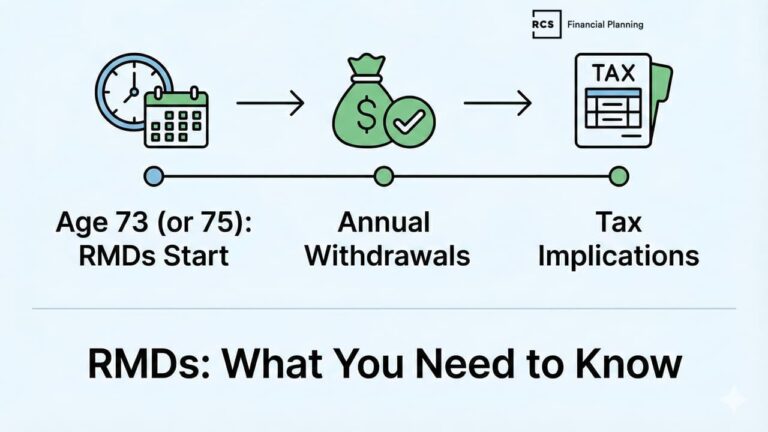Should You Consider a Roth Conversion?
Roth conversions have become a hot topic for retirees, offering the promise of tax-free growth and withdrawals. However, jumping into a Roth conversion without fully understanding its impact can jeopardize your financial goals. This post is designed to help you evaluate whether a Roth conversion is right for you—and to explain why a personalized approach is essential.
If you’re here because you’re considering a Roth conversion, you’ve come to the right place. This guide isn’t about generic advice. It’s about helping you make informed decisions based on your unique financial situation.
What is a Roth Conversion? (And Why It’s Not Always the Right Choice)
A Roth conversion involves moving funds from a traditional IRA or 401(k) into a Roth IRA. While the benefits—like tax-free growth and withdrawals—are clear, they come with upfront tax costs. Understanding these costs and their long-term implications is critical before you act.
Why Personalized Roth Conversion Strategies Are Essential
Every financial situation is different. That’s why rules of thumb, like “convert as much as possible before age 72,” can lead to mistakes. At RCS Financial Planning, we’ve seen how generic advice can fail to account for crucial factors like:
- Your retirement spending needs.
- The tax implications of conversions in the short and long term.
- The impact of higher income on Medicare premiums or other income-based programs.
Here’s what matters most:
- Your Goals: Are you looking to reduce taxes in retirement, leave a tax-efficient inheritance, or manage RMDs?
- Your Breakeven Age: When will the tax savings of your conversion outweigh the upfront costs?
- Your Tax Picture: Are you prepared to pay higher taxes today to save in the future?
Visit our retirement planning page to learn more about how we help clients understand their sustainable portfolio withdrawals and the role Roth conversions play.
When Does a Roth Conversion Make Sense?
Based on years of experience, we’ve found that Roth conversions are often beneficial when:
- You anticipate higher future tax rates.
- You have external funds to cover the tax costs of conversion.
- You want to reduce RMDs and associated taxes in retirement.
- Your beneficiaries will likely face higher tax rates, making Roth IRA inheritance more advantageous.
When a Roth Conversion Might Hurt Your Plan
On the other hand, Roth conversions can backfire if:
- You don’t have a sustainable withdrawal plan. The taxes from conversions reduce what’s available for spending.
- Your income spikes into a higher Medicare IRMAA bracket, increasing costs.
- You expect to be in a lower tax bracket in the future, making current taxes unnecessarily high.
Why Analysis is the Key to Roth Conversion Success
Unlike cookie-cutter advice, a thorough analysis ensures that every decision aligns with your goals. At RCS Financial Planning, we evaluate:
- The short-term tax impact of your conversion.
- Your breakeven age, where the benefits of tax-free growth outweigh the upfront costs.
- The trade-offs, such as higher IRMAA premiums today versus long-term savings.
This level of detail helps you avoid costly mistakes and make confident decisions about your financial future.
How to Spot Unhelpful Advice
If you’re hearing generic advice like “convert as much as possible” or seeing calculators that don’t account for your complete financial picture, it’s time to dig deeper. Roth conversions are not one-size-fits-all, and advice without analysis can be harmful.
How We Help: A Personalized, Client-First Approach
At RCS Financial Planning, our goal is to help you create a Roth conversion strategy that works for your unique needs. Here’s what we offer:
- Personalized Planning: We start by understanding your goals and running detailed analyses.
- Long-Term Focus: Our strategies consider both the immediate tax impact and the lifetime benefits of conversion.
- Expert Guidance: We help you weigh the pros and cons, ensuring every decision aligns with your financial plan.
Take the Next Step Toward Financial Confidence
If you’re considering a Roth conversion, don’t settle for one-size-fits-all advice. The right strategy can reduce your taxes, increase your financial flexibility, and provide peace of mind.
Contact us today to schedule a consultation and create a Roth conversion plan tailored to your goals.
Final Thoughts: Why Roth Conversions Are About More Than Taxes
At its core, a Roth conversion isn’t just about taxes—it’s about securing your financial future. By taking a personalized approach, you can avoid unnecessary costs and ensure your plan reflects your unique circumstances.
If your current advisor or resources aren’t providing the analysis you deserve, it’s time to ask questions. You—and your financial future—deserve better.
Ready for clarity and confidence in your Retirement plan?
30 minutes · No cost · No obligation
This material is provided for educational, general information, and illustration purposes only. You should always consult a financial, tax, or legal professional familiar with your unique circumstances before making any financial decisions. Nothing contained in the material constitutes tax advice, a recommendation for the purchase or sale of any security, or investment advisory services. This content is published by an SEC-registered investment adviser (RIA) and is intended to comply with Rule 206(4)-1 under the Investment Advisers Act of 1940. No statement in this article should be construed as an offer to buy or sell any security or digital asset. Past performance is not indicative of future results.






